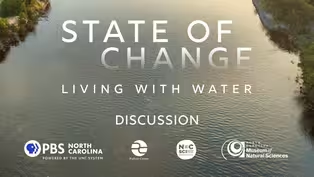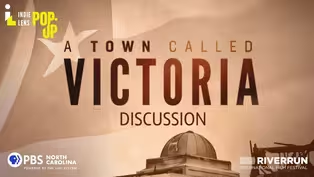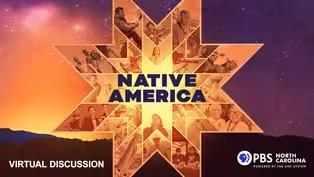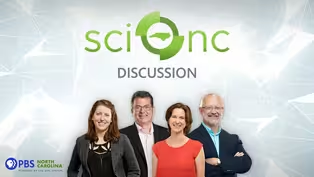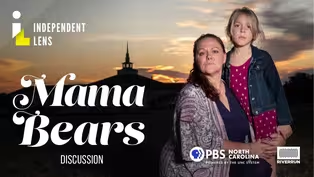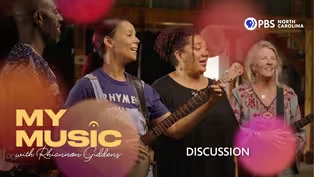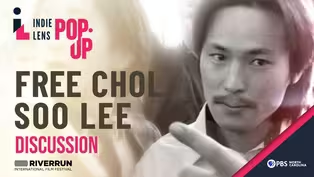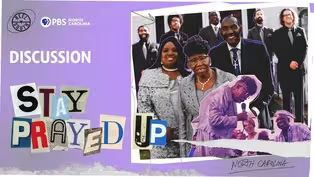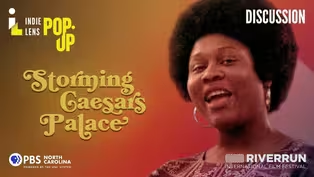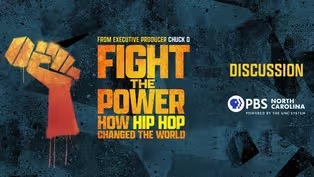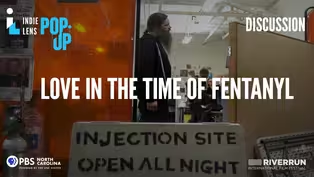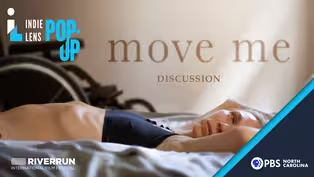PBS North Carolina Specials
Discussion - Southern Storytellers
7/12/2023 | 42m 13sVideo has Closed Captions
Author David Joy and others discuss storytelling and their new PBS series.
Heather Burgiss, Director of Original Productions at PBS North Carolina, leads a conversation about preserving the history of people and communities through storytelling, filmmaking, poetry and art. Our panelists: David Joy, author; Jaki Shelton Green, NC Poet Laureate; Billy Welch, Indigenous mask maker; and Brooks Bennett, filmmaker.
Problems playing video? | Closed Captioning Feedback
Problems playing video? | Closed Captioning Feedback
PBS North Carolina Specials is a local public television program presented by PBS NC
PBS North Carolina Specials
Discussion - Southern Storytellers
7/12/2023 | 42m 13sVideo has Closed Captions
Heather Burgiss, Director of Original Productions at PBS North Carolina, leads a conversation about preserving the history of people and communities through storytelling, filmmaking, poetry and art. Our panelists: David Joy, author; Jaki Shelton Green, NC Poet Laureate; Billy Welch, Indigenous mask maker; and Brooks Bennett, filmmaker.
Problems playing video? | Closed Captioning Feedback
How to Watch PBS North Carolina Specials
PBS North Carolina Specials is available to stream on pbs.org and the free PBS App, available on iPhone, Apple TV, Android TV, Android smartphones, Amazon Fire TV, Amazon Fire Tablet, Roku, Samsung Smart TV, and Vizio.
Providing Support for PBS.org
Learn Moreabout PBS online sponsorshipMore from This Collection
Discussion - State of Change: Living with Water
Video has Closed Captions
Panelists discuss resilient North Carolinians adapting to climate change. (28m 54s)
Discussion - A Town Called Victoria - Independent Lens
Video has Closed Captions
The filmmaker and former Victoria residents share their story. (46m 51s)
Discussion - Native America Season 2
Video has Closed Captions
Panelists discuss preserving the languages of Native American tribes. (39m 1s)
Video has Closed Captions
Sci NC executive producer and host, Frank Graff, chats about upcoming Season 6 of Sci NC. (26m 6s)
Discussion - Mama Bears | Independent Lens
Video has Closed Captions
Producer and director Daresha Kyi discusses the film and LGBTQIA+ advocacy. (34m 41s)
Discussion - My Music with Rhiannon Giddens
Video has Closed Captions
Discussing the series with producers Will & Deni McIntyre and country artist Rissi Palmer. (39m 56s)
Discussion - Free Chol Soo Lee | Independent Lens
Video has Closed Captions
Local lawyers, professors and nonprofit leaders discuss wrongful convictions and reentry. (40m 44s)
Discussion - Stay Prayed Up, Reel South
Video has Closed Captions
The filmmakers discuss their journey with Mother Perry and The Branchettes. (45m 4s)
Discussion - Storming Caesars Palace | Independent Lens
Video has Closed Captions
Local professors and nonprofit leaders discuss welfare and the social safety net. (33m 2s)
Discussion - Fight the Power: How Hip Hop Changed the World
Video has Closed Captions
Local experts discuss the history of hip hop with PBS North Carolina. (59m 43s)
Discussion - Love in the Time of Fentanyl | Independent Lens
Video has Closed Captions
Local harm reductionists, therapists and others discuss the opioid crisis and more. (55m 44s)
Discussion | Independent Lens: Move Me
Video has Closed Captions
A dancer with blindness and disability advocates discuss adaptable arts programs. (38m 46s)
Providing Support for PBS.org
Learn Moreabout PBS online sponsorship- For this preview screening of "Southern Storytellers," I am Heather Burgiss, Director of Original Productions at PBS North Carolina, your statewide public media network, and one of the nation's largest PBS affiliates.
We are proud to bring you content like this film you just watched that really lift up the voices and connect us to our roots as North Carolinians, southerners and Americans.
And as Director of Original Productions, it is my job and my passion to tell stories and shepherd stories through the process from inception to audience.
And it is my absolute honor to bring this new series and to welcome four tremendously talented North Carolinian storytellers.
And with that, I would like to welcome our very special guests this evening.
I'm thrilled to be joined by David Joy, award-winning author, featured in "Southern Storytellers."
And David is joining us from Cullowhee this evening at Western Carolina University.
Good evening, David.
- Oh, hey.
How are you?
- Great.
And also joining us is Jaki Shelton Green.
She is our North Carolina poet laureate.
Hello, Jaki.
- Good evening, Heather.
- Billy Welch, Snowbird Cherokee indigenous mask maker and artist is joining us.
Hello, Billy.
- Hello.
- And Brooks Bennett, an Emmy Award winning filmmaker and storyteller.
Brooks is working on a documentary about the indigenous Snowbird people and their traditions.
And it is a pleasure to have Brooks with us.
Hi, Brooks.
- Cheerio, Heather.
- Thank you all for spending time with us this evening.
Hello, hello.
David, what a beautiful opener.
I love that you opened that perfect.
Let's begin with you.
You grew up near Charlotte and you always talk about how you grew up very rural near Charlotte, and that's disappeared.
And now you call Western North Carolina home.
Your books, award-winning books, delve into the southern experience in such a beautiful and sometimes aching way.
Share with us why it was important for you to be a part of this special series.
- Well, I think the series wound up developing into something that maybe it wasn't when it was pitched to me originally, but originally the idea was to tell the story of the place that I write about.
And what I told Craig initially, I said, "That's not my story to tell."
I said, "But let me introduce you to the people's who's it is."
And so over the course of like three years and three separate weeks, I took Craig and introduced him to the people I thought could tell the story of that place.
You know, I took him to a Cherokee writer who took him to Kituwah Mound.
I took him and we sat with the congregation at an AME church that was founded in 1892 by 11 formerly enslaved peoples.
And so I was trying to tell the story of a place, but at the heart of all of that, I think we were dealing with the same thing, which is storytelling and getting the story right.
And so that's kind of how it came to be and how I became a part of it.
- And I knew that Craig Renaud, who was the Executive Producer and Filmmaker approached you, and did you kind of form a relationship as he was filming, do you feel?
And he was really understanding what was going on in Jackson County?
- Yeah, yeah.
You know, I think I took him to the right places and we spoke to a lot of the right people.
And to be honest, I hope something becomes of that footage, because I always felt out of place in the sense that, you know, like you said, I grew up in Charlotte, very much in Charlotte.
My fam, I'm a 12th generation North Carolinian.
My family's been right there, right around Charlotte since the 1700s.
And the place that I grew up doesn't exist anymore.
And so I spent about half my life there.
And I've been here a little more than half of my life.
But the things that I am attached to here are all of the things that were erased from the place that I came from.
- And thank you so much.
I'm gonna move on to Jaki Shelton Green, our North Carolina poet Laureate.
And Jaki, poetry is such a beautiful way to story tell, and you always talk about how you want your poetry to uplift the voices of the oft-forgotten, the disenfranchised.
Share with us why storytelling is so tied to your poetry.
- Well, for me, all of my work has always been located somewhere inside of story.
Growing up in the South, the richness, you know, the wealth of learning my own personal genealogy was often shown during funerals.
So, as a child sitting in all of these different special occasions of reunions and homecomings at churches, I learned as a very young child how story influences, inspires, and not just the amazing positive sides, but also thinking about how some of us in the south, our stories have been muted, erased, disenfranchised, our voices have been silenced.
And my role as a poet laureate, my role not as a poet laureate, but as a writer, as a poet, is to create a different narrative and different gateways so the voices that have been silenced and the stories that need to be told that connect our past and present will continue to do so.
And the poetic form has been my vehicle for doing that.
- Thank you so much.
I'm gonna move on to Billy.
And Billy, I know that we have been able to see your masks through our story that we did for PBS North Carolina, and your art form.
And mask making is truly a beautiful way to represent your heritage and the Snowbird Cherokee community.
How did you learn your craft and why is it important for you to pass this story down?
- Well, I'm actually self-taught and went to Cherokee and looked around the craft shops when I started selling my crafts, smaller stuff.
Moved on to the masks and it just kept coming back.
And there's so many legends, stories, lore of all the Native American stuff through the mountains here.
And the log, when I opened it up, I see the grain and it leads me to whatever I come to, to make a mask.
I don't know, actually, until I opened the log up.
- I love that.
I remember that from this story that you kind of let the wood tell you.
- Yep.
- And maybe in just a little bit we will kind of, we'll let you show us some of that.
That will be fantastic.
But that's so powerful because a lot of your Snowbird community, they tell their story through crafts or through telling the legends- - Yeah.
- And the language, and keeping that going.
And that's incredibly important for you all, I know.
- Yeah, I wanna preserve it somehow, and this is my way of doing it.
So you buy a mask and you have the story that goes with it.
You can pass that on to your kids, to their kids, and it'll last from now on.
- And I know, as we're looking, talking about the Snowbird Cherokee community, Brooks, who is our Emmy award-winning filmmaker here, we have been working... You've worked on so many stories in the western North Carolina area, and one of those stories, is a film that's coming out in November about passing those kind of old ways and traditions down, and how the Snowbird community is doing that.
Brooks, when you look at stories, you know, how do you identify what is gonna help tell the story the best way; through pictures, through sound, through visuals and interviews?
What do you do to make sure that it's telling the very best story possible?
I think we're having trouble hearing, Brooks.
- Yeah, in this area specifically, it's really easy to tell these stories because the stories just present themselves like David was saying, with the mountains and the streams and the landscapes, immersing yourself in an environment.
The Blue Ridge Mountains or some of the oldest mountains in the world.
And so many stories have existed there for so long that we're only starting to tap into.
And when I look at a story, you know, I just see the beauty of the world and it's just kind of my job to interpret that and provide it in a way that's digestible for someone that might not be there to experience it.
And this film in particular, it's a story of reclaiming heritage and traditions, and things that were once attempted to be stamped out.
And it's kind of, it's tracking the next generation of storytellers in the Snowbird communities.
They figure out what their culture and tradition is, and find new routes to preserve and protect it for the people that might not be here to talk to folks like Billy right now.
- And we're so glad that he's here to talk to us.
I can't wait to see his masks a little bit later.
I'm gonna turn to David again.
David, I love that you started this.
This was the perfect screener for us because you'd be... We started this "Southern Storytellers" with you in Jackson County, and at the beginning you quote from your essay, "One Place misUnderstood," about how the canvas isn't blank because there's landscape and I'm just, you know, condensing a little bit.
But you'd say that a character claws himself from the ground, he emerges from that place.
And for you, that's Jackson County, North Carolina.
I just love that.
And I just wanna dig a little deeper.
Can you share with us what place means to you, and how that character emerges?
How does that help with your storytelling?
- Yeah, well, I think it's everything, you know?
And so, like right now I'm in Jackson County, which butts up to the Qualla Boundary where Billy's sitting over there in Cherokee and Billy's accent is indicative of the boundary.
Billy's accent is very much tied directly to the Cherokee.
That's not a white person from Jackson County's accent.
And my accent isn't a white person from Jackson County's accent.
I sound like I'm from the Piedmont.
And if you're from the mountains you recognize that, and you say, "Yeah, he ain't from here.
He's from somewhere else."
But the idea being that, that the place carries sound.
And so, when a character emerges, they're gonna phrase something a certain way.
To be quite honest, one of the most difficult things for me as a writer for a long time was forcing a character to speak 'cause a whole lot of times a mountain person ain't gonna talk to you, you know?
They'll just sit quiet and let it play out.
But yeah, I think place is everything.
And I've never felt limited by place.
That Eudora Welty line of "One place understood helps us to understand all places better."
That's the same thing that James Joyce said, you know?
James Joyce was asked, "Why do you only write about Dublin?"
And he said, "Because if I can get to the heart of Dublin, I can get to the heart of all cities in the world."
And that's the truth of it.
When you're telling a story, the reason that story exists is very much tied to the human condition, you know?
It was probably in the beginning, survival, you know?
It was you pass stories down for this and for that.
But story is in our blood in the same way that music is, and the same way that art is.
And so, yeah, I think for me, as a 12th generation North Carolinian, and as somebody who's spent the majority of their life right here in Jackson County, the truth is that I just don't know anything else.
But I don't need to, I can tell every story I ever wanna tell, and I can tell it right here.
- And I think that that's really interesting because I think as we move to Jaki, Jaki, your poetry inspires so many, and your experience inspires.
And I think experience is everything when you're storytelling.
And why is telling stories through poetry so important to you, Jaki?
Jaki?
[Heather chuckles] We'll move on.
There she is.
- I was on muted.
Can you hear me?
- There you go.
Yes, yes.
- I was saying that sometimes the stories that we bear witness to collectively and personally are sometimes heavy to carry in their true forms.
And poetry for me has always been a gleaning process, to gather the stories, the heavy ones, the slight ones, the rich ones, and the lean ones.
And to be the gleaners for giving language that matters, giving language that emboldens certain voices.
I liked what my colleague was saying a few minutes ago, David, about people might not speaking out, but silence is a language as well.
And how do we interpret those silences?
You know, as southerners, we know the silence of that bump in the middle of the night.
And it binds us across all the boundaries of culture.
It binds us, especially if you're southern and you know the codes of a self.
So learning to create those containers for me, for as long as I have been writing, the containers that I can dip into constantly be they history, but for me, how does that history carry us into a legacy of a future?
I believe right now that our stories are medicine and we need these stories, perhaps more than we have ever needed to preserve and cherish, commemorate, and celebrate our stories.
I believe that when we tell ourselves stories, when I'm reading poetry and people can hear the stories, that the more we tell ourselves stories, the more we find ourselves inside of each other's stories, that our humanity resides there.
And that's what I stand for, for the possibilities of my poetry to be that unification tool, to help people straddle and transcend these ties that have fractured us, our history somehow.
- We often, and I think that's beautiful, 'cause we often hear that storytelling, documentary work, is kind of an empathy machine when we can experience someone else's culture, someone else's experience in the way that we do, whether through whatever form, that it creates empathy and understanding.
And I think you've talked about how you hope your poetry is accomplishing that.
- Thank you.
- Yeah.
Well, moving on to Billy.
Billy, we would love to see some of your masks now 'cause it's not simply art.
And you talk about how that wood, when you're working with it, whether you get it from the stump on the road or however each one calls to you and kind of tells you where you're going with that art.
Can you tell me a little bit how you start that mask?
Show us the mask, we would love to see it, and how you really preserve your history with each mask you create.
- This one here is a shapeshifter.
- Yeah.
- He's a half man, half wolf caught in the transition.
And this one's got the black on the other side, so you know the story of the good wolf and the bad wolf inside of all of us.
This is one that might be the good wolf out here and the man is bad with the black.
'Cause the black represents bad medicine.
But you can see it in the hair, if it's hanging on the wall, the grain, it leads it like hair flowing back to the back of his head, just like our hair flows.
And that's the things I talk about when I open up on one.
The log starting here, you see the grain, find the center and follow it.
It's like layers, peeling back layers.
- And so, the grain really kind of decides in some way- - Yeah.
- Or leads you to what each mask will be.
- Yeah.
- And do you feel like in some ways that's a spiritual experience for you?
Do you feel like sometimes that's, yeah.
- It's so many delights in the just start chopping on it.
And in the video Brook's done, the eyes there, you know, say it's gonna reveal itself.
You can actually see those eyes open as I'm chopping.
When that happens, that's when it's the real thing.
You know, that's where you get that from.
It's a real empowering to have that and to feel it.
- Yeah.
- Be able to present it in a mask.
- And I know that, you know, kind of one of the big pushes that you wanna make sure you're preserving, you're keeping that legacy alive, and you're telling those stories.
I know elders are telling stories.
You're telling stories through art and whether it's traditions or games or songs, it's so important to continue whatever form in keeping those traditions alive.
Do you agree with that?
- Yes, whether it be poetry, book writing, he's got it on paper, I got it on wood, she's got it on paper.
It's all there and it'll last as long as you take care of it and you hand it down.
That's the same thing with the mask.
You present it to someone and they'll take the story, may even add to it; where they got it, how they got it.
So, it's gonna grow.
- And that's beautiful.
I love that.
The one you're showing us right now.
Tell me about that one real quickly.
I'd love to hear about.
- It's a paint clan.
The red, the adult medicine of the clan.
The red's for the good, and the black's for the bad of course.
But it's a pretty large mask.
- Okay, it's beautiful.
- And you can see the grain in it though.
It'll show up on it along the sides and on its forehead.
- Now, I have, let's see...
Thank you, Billy.
We do have some audience questions, but I wanna quickly get to Brooks.
Brooks, in your opinion, I know you've been working with Billy to tell the story and many others in the community.
When you're looking at what, what makes a good story for film, what elements are you looking for to elevate that narrative to really lift up the, whether they're characters, the production aspects, what are you looking for to tell that story?
- So, my background initially was in philosophy, and when I look at the world, I see every aspect of it is as a story that is just waiting to unravel or to be told.
And everything that I've come across in this community especially is there's like a inherent transcendent value to all of these.
I don't wanna call them crafts, but traditions, and everything that I've seen here, everything that I've laid eyes on, you see physically what it is, you see the end result.
But what you don't see is kind of the spiritual essence or kind of the life behind the product.
So when I'm looking for a story, I'm exploring the origin of the story, the origin of the tradition, what in my opinion it's bringing to the world other than just being something that might be an artifact in a museum that someone comes across and, says, "Oh, that's really pretty, that's really cool."
I value the aesthetic quality of that.
But there's so much more behind it.
And I think that documentary as a medium is the perfect way to express what those things truly embody.
And without revealing any secrets or things that I shouldn't talk about, everything specifically with Billy that I've ever seen him produce, I feel it too.
And if I feel something very deeply and it resonates with me on a spiritual level, I know that it's a story that the world needs to have in front of them.
- And I think that's fantastic because I think as storytellers you have to have a bit of intuition.
You have to be receptive, you have to be able to bring in those feelings and those experiences to be able to tell other people's stories.
And I think that that's powerful, you know?
It's something you have to tune into to tell your own story even.
Yeah, thank you, Brooks.
We have a question.
I love this.
I'm gonna direct this to David because this is a teen writing a story set in Appalachian region of NC.
"How would you suggest I approach the Appalachian characters to make them accurate and intriguing, but not stereotypical and demeaning?
I care a lot about historical accuracy and thorough research."
David, what would you say about that?
- I think anytime you know that you're trying to write across a perspective, so whether that be across race, across place, across gender, it's always gonna boil down to an aspect of power.
And so for me personally, as a white male writer, like there is no more privileged perspective than that.
Which means that when I'm gonna make that leap, I have to do a lot of work, and I also have to wrestle with the fact that I'm inevitably going to make mistakes.
And that when those mistakes are made, that I can't be defensive, that that's the moment that I have to shut my mouth and listen.
But there's a really great writer named Alexander Chee, and he said once kind of along these lines, he said, "The first question to ask yourself is why?"
So why are you telling the story in Appalachia?
And he said, "The next thing you need to ask yourself is how many of those people do you know?"
Do you know anybody that's from the mountains?
Do you know what that sounds like?
Are there people that you could ask questions of?
And then the third thing he said that you need to ask yourself, and for me, this is the most important and I think that it was probably something that I had never heard said before then but the minute he said it, it made so much sense.
He said, "How many of those writers are on your bookshelf?"
So in other words, how many Appalachian writers are you reading?
And where this translates elsewhere is like a whole lot of times it's like a white person wants to write a Black character, but they've never even read any Black authors.
They don't have a favorite Black author.
And that becomes incredibly problematic and it ties back to this idea of power.
But I think when you're dealing with a place like Appalachia that has historically been misrepresented and exploited for as long as it has by outsiders, it's always gonna be a really, it's gonna be ground that has to be tread carefully.
And that's not to say not to do it.
You set the story where the story needs to be set, and I think that a writer, above all else, has to do two things.
They have to work fearlessly and they have to allow themselves to be vulnerable.
And so again, it's recognizing that if this is where the story needs to be told, I'm gonna do all of the work I can to get it right, I'm gonna do so knowing that I'm writing about a place that has historically been exploited and misrepresented, and I'm also gonna take responsibility for when I make my mistakes.
I'm gonna shut my mouth and I'm gonna listen.
And I think that everybody in this world would do a great deal of good if we'd all just shut our mouths and listen a little bit more than we talk.
- Jaki, do you have anything to add about that?
- Thinking about this and I was thinking about permissions and the permissions that we give to each other and the permissions that when we are doing the documentary work, we're doing the research, is from whence I enter is always the question that I answer myself and I don't enter as a spectator or I don't...
But what does it mean to take up residency, to have a character take a residency inside of certain stories, and the agency that's needed for that character.
As I was listening to David, I was thinking about not only have certain people not read any Black authors, but many people have never met a Black person before.
So, it's important that you know your subject.
I remember Toni Morrison telling me many, many years ago when she was trying to construct one of her characters in "Beloved."
She said that she never had trouble making a woman character.
That she knew how to do that, she knew the anatomy she knew what she thought, what she smelled, everything.
But she said she actually had to conjure that male character to her to bring forth that male character so she could, like a blind person, touch every aspect of that being.
And I think that when we are writing, perhaps outside of our... As an outsider, and I don't like to use that word, but sometimes when we are approaching material that we're cautious about, I think we also have to question why we're cautious.
And I think we have to... Because I think there's so much, people are so afraid right now of doing the wrong thing, misappropriating, being disrespectful, but there's also writer's license.
I think it would be a sad world if someone told me I could not write about my Irish forefathers who I have never met, but they exist and they're real.
So I think that it's all about the permissions that we grant ourselves, the permissions to how far we're willing to go with the research, how far we're willing to go to actually go meet the character.
That character may be sitting in a coffee shop in your town.
So, accessibility to these characters is very important.
- Thank you, Jaki.
Thank you.
There's a question for Billy.
Billy, someone writes, they want to know if Billy has any students or young people apprentices learning his trade and or does he give lessons and teach his craft?
- You come to my shop any Saturday.
I teach high school and still to work 12 months through the summer.
I also can offer up anything you wanna know about.
- I'm coming.
- Anybody.
- That's great.
Do you have like a formal workshop or anybody that comes in, you'll just start to demonstrate?
- Yeah, I'm there every day, doesn't matter, to carve, and that's what I do.
And Brooks can tell you it's a lot a lot of work.
It ain't so easy.
- And you do teach high school too, right?
Or you have a summer program.
Teach at Robbinsville High and so, yeah.
- Yeah.
- Yeah, we offer a six week class through the summer of arts and crafts, quilting, beading, corn husk dolls, sewing dolls, all that by different artists.
- That is great.
Thank you so much.
I wanted to kind of maybe ask a question for everyone and you can jump in.
What is the best advice you can give to folks who want to tell a story through any medium?
Does anyone have any thoughts about that?
- I guess I can start this, and I was thinking about something that Ada said, and it's something that I've always kind of allowed myself to kind of guide me, is thinking about the ordinariness and everydayness of my creativity.
I don't always...
Yes, I love going on writing retreats and yes, I love going to wonderful spaces and hunkering down and writing, but the work is also at the bottom of that salad bowl when we're making the salad, it's in the laundry when I'm having to do the mundane thing of doing of laundry.
That creativity is when somebody's changing the oil.
Just thinking of not having this kind of Eurocentric idea that our creativity lives somewhere else and we need guides to go get it, but it's within us, it's with us and it's in this terrain, it's in our geography, all these landscapes that we talk about.
And I think for me it's paying attention.
It's showing up, paying attention, telling the truth, the truth by which you know it for yourself, and not sweating the outcomes, you know?
Sometimes I think that we self-edit and self-destruct our creativity sometimes instead of just allowing it to flow and not being afraid to make the mistakes, not being afraid to just say, "Well that sucked."
You know?
And taking a different turn.
So I would say paying attention.
Paying attention and sort of looking around just where you are.
What you need to say that's not been said.
- Anyone else wanna add to that?
Anyone else?
- Yeah, I can.
For me, it's about, it's a compulsion to create.
Like it feels like I'm gonna die if I don't.
And so when a story takes hold, it's very much a matter of like, I have to do it.
But I will say that, that I think one of the biggest steps in me maturing as a writer was coming to trust my own process.
And it was that, like right now I'm sitting at Western Carolina University, Ron Rash, who, most people are gonna know his novels works here.
And when I watch Ron work, he works so differently than me.
Like every day he poured a glass of tea, the tea was on the left hand side of the computer, and then he would start, he would write poetry in the mornings.
And he did this every day, like clockwork, this is what he did.
And as a young writer, when I saw that in a lot of ways it was debilitating because I didn't work like that.
And so, like, I felt like a fraud.
It was like, I don't do that.
He's good.
And so maybe I'm not good because I don't work like that.
And then one day I ran across this interview with Raymond Carver in "The Paris Review."
And Raymond Carver was talking about the fact that when he's not working, he said, "It feels as if I've never written a word a day in my life."
And, like, that's me.
When I'm not actively working on a story, it feels like I'm not a writer, like I've never written a word.
Like I couldn't, you couldn't be like, "David, go write a paragraph."
I couldn't do it.
But he said, "When the story takes hold," he said, "It's what John Asbury called the paddle wheel of days."
It's just one day dovetailing into the next, into the next.
And that's very much me.
And so, when the story takes hold, it's the only thing that exists.
And so, for me, it was coming to trust in that process.
And so now when I hit those dead times that for a lot of people it might be a scary place, that's not a scary place at all for me because I know that I'm a storyteller and I know that eventually a story's gonna take hold and that when it does, I'm gonna have to just surrender myself to it.
- That's beautiful.
Yeah.
And I think that we have another question.
I wanna ask each one of you all to share what's next for you?
What's on the horizon?
What new story is there to tell or to make or what is transpiring?
I'll start with Brooks.
- So, my story keeps unfolding and revealing itself.
The story that I'm working on right now, or I guess a little vignette from the larger doc is a Cherokee tattoo artist I happen to come across working on new storytelling project.
He's actually got some work here in the museum too, but in A way that visibly every single day, you know, the wearer of the tattoo is maybe protected a little bit by it, is kind of wearing their culture on their sleeve, literally.
And, you know, I think like exploring new mediums for traditional ways and values is what I'm currently interested in.
And you know, in the world of digital media, everything is incredibly saturated.
And when you were talking about stories earlier, everyone has like an Instagram story.
Everyone has some kind of reel that they're sharing every day.
But it's like, what aren't you sharing?
What are you interested in that you're not wanting to display that is maybe at the core of you?
And that's what I'm finding right now with all these stories is they don't have major exposure, there's not tons of promotion and you gotta get back into the deep pockets to find these new stories.
- Oh, thank you.
Anyone else wanna share something that's coming up?
- Well, I just received a major grant with a collaborative visual artist who translate one of my poems into a multimedia kind of visual experience that is gonna show at a museum that I can't name right now.
So I'm really excited about that and lots of other things as I round out, you know, this is my fifth year as a poet laureate.
Coming up 2025, I will no longer be the poet laureate.
So I have many, many projects that I am happy to get back to.
- Billy, what about you?
What's your new mask?
- Well, I'm making some masks for the museum to swap out what display they have now.
And by the first year I should have one in the North Carolina Art Museums.
A lady contacted me the other day about it and I haven't really got into it, but she wants to have a display this spring and I'm gonna do that.
- David?
- I got a novel that comes out in about two and a half weeks I think, called- - What's the title of that novel, what's the name of it?
- It's called "Those We Thought We Knew."
And if you wanna see somebody try to write across boundaries and undoubtedly make mistakes, that'd be a good one to pick up 'cause I'm sure I dropped the ball in a lot of places with that book.
But yeah, that, and I was thinking as you asked that question, it's like when you're writing a story, like you can only see so far as the headlights.
Like you're driving down a pitch black road, you can only see so far as the headlights.
And when that's happening, like, you can't envision what's gonna come next.
And then there comes a moment where like you cross, you come around that final curve and your headlights hit that forest service gate or whatever it is, you know, you can see the end.
And for me, every time I've seen the end, I've been blessed in that there was another story that started immediately.
And so when I was finishing "Those We Thought We Knew" I had a woman in a dream that just told me this story and I woke up and my girlfriend was sitting beside me.
She thought I was crazy 'cause it was like, "I need paper."
It was like, "I need paper," and it's the middle of the night, you know?
- That's like a movie.
"Gimme the paper."
- I start writing this down.
But so as far as what I'm excited about, it's that.
I think most artists are only ever excited about what they're currently working on.
And so right now, I think that's the thing that's got me going.
- Well, I appreciate you all sharing tonight.
Thank you all for being with us.
It's been truly enlightening and I hope everyone who has watched this has felt the same way because it's so special to tell our stories.
I think it's just truly remarkable how we see the world and how we share it.
So thank you to our wonderful panelists for joining us this evening.
Many thanks to you all, our audience, for logging on and participating in the conversation.
A special shout out to three local storytelling organizations for promoting this event, the NC Association of Black Storytellers, NC Storytelling Guild and Asheville Storytelling Circle.
Thank you all.
And many thanks to Arkansas Public Broadcasting.
Arkansas PBS creators, filmmaker, Executive Producers, Craig Renaud, and CEO and Executive Producer Courtney Pledger, and the Corporation for Public Broadcasting.
Their grant funds made this event possible.
"Southern Storytellers," don't miss it.
It premieres next Tuesday, July 18th at 9:00 p.m. on PBS NC and continues Tuesdays through Tuesday, August 1st.
Please check your local listings for dates and times.
If we have some South Carolina friends, I saw some Charleston friends that were on here, also check your local PBS station.
You can stream it anytime on our website at video.pbsnc.org and on the PBS App.
Please be on the lookout in your inbox for an email with a link to this evening's discussion, helpful resources and the links to learn more about tonight's incredible panelists.
And they were wonderful, weren't they?
Find your story and a way to tell it.
Happy story telling, y'all.
And thanks again for joining us.
Stay safe and well.
Goodnight.
- Goodnight.
Support for PBS provided by:
PBS North Carolina Specials is a local public television program presented by PBS NC
